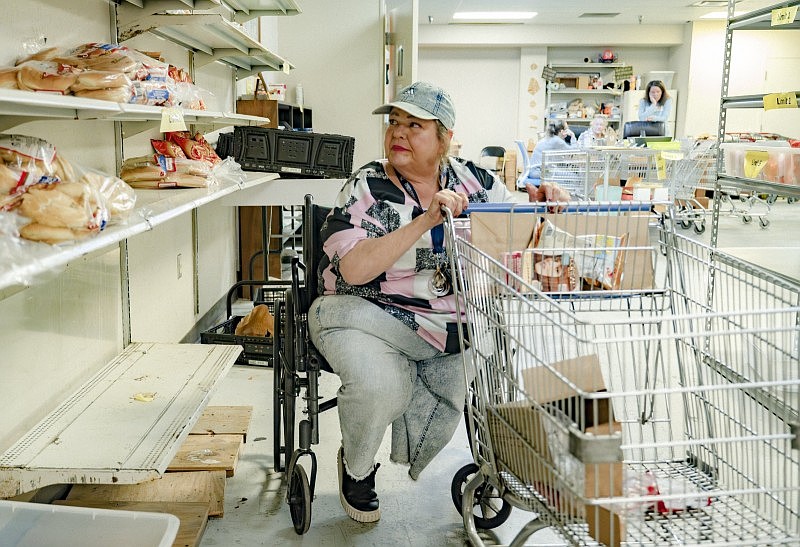Copyright Arkansas Online

In recent days Margaret Douglas, director at Helping Hand of Greater Little Rock, has been experiencing a sense of déjà vu. It's October 2025, but in the food pantry located at 1601 Marshall St., it might as well be the spring of 2020. Or worse. "People (are) coming in telling me their life stories, which I love to hear," Douglas said. "Because they're just scared." On the eve of benefits from the Supplemental Nutrition Assistance Program potentially expiring for millions of Americans and more than 200,000 Arkansans, Douglas said visitors to Helping Hand are "almost panicking like they were" at the height of the covid-19 pandemic. "I'm receiving phone calls," Douglas said. "People want to know where they're going to get their next meal." She said the food pantry typically averages providing perishable and non-perishable food to 100 families a day, four days a week, and that those families cross "all economic lines." A family is only able to receive food from Helping Hand once a month. But that's during normal periods of time. Douglas, 76, has been working at Helping Hand for 13 years and just took over as director this month in the midst of the second longest government shutdown in American history. The shutdown, which began Oct. 1, shows little sign of being resolved, as Democrats in Congress demand that expiring healthcare subsidies be addressed while Republicans refuse to negotiate until the government is reopened. As a result, the U.S. Department of Agriculture informed states earlier this week that SNAP benefits, which provide money for food to 40 million Americans living in poverty, is out of money and will come to a halt on Saturday. The program provides as much as $298 monthly for a single person to $1,756 for a family of eight. While other federal food assistance programs, such as the National School Lunch Program and the Special Supplemental Nutrition Program for Women, Infants and Children, haven't yet run out of funds, SNAP recipients are scrambling to find food. "With the situation that's going on right now, I expect us to possibly be seeing 125 to 130 families a day," Douglas said. At the beginning of the week, which marked four weeks since the shutdown started on Oct. 1, Douglas said that federal employees began visiting the brick building on the south side of Interstate 630. "I've been in contact with the Arkansas Food Bank," Douglas said while a team of volunteers began shutting down the Helping Hand for the day. "I did a zoom meeting with them yesterday, and we're gearing up. It's next week when we expect to really get the impact." What happens next week if Arkansans are unable to access to SNAP benefits? According to Claire Tiffin, director of community engagement at the Arkansas Food bank, the state's charitable food network could face a food need it is "not designed to meet." "I would say we're watching it really closely, and we've activated our disaster response for a reason," Tiffin said. "This is going to be an unprecedented need we have not seen here at the food bank." No Federal Calvary Just like during the covid pandemic five years ago, the Arkansas Hunger Relief Alliance and the rest of the its charitable food network -- between 550 to 600 food pantries across the state -- is in a "crisis mode," said Alliance CEO Sylvia Blain. However, there is one significant difference between what is unfolding in communities across the country now compared to what happened during the worst parts of the pandemic. "It was actually the federal government that stepped up to help at that time," Blain said. "That's a huge difference and they're stepping back, and we don't see any indication that there's going to be any collaboration or compromise that helps us move closer to a solution. "The crisis feels very similar. The response from the federal government is really different." Tiffin said the Arkansas Food Bank service area stretches to the borders of Texas and Louisiana, some of the Mississippi border, as far north as Independence County and as far west as Montgomery County. That includes six Feeding America food banks. Even before the scheduled end of SNAP benefits on Saturday, Tiffin said the organization was seeing number projections "akin to covid." "We're looking at around 100,000 people who are going to be needing assistance within our service area after SNAP benefits do not go through this month," Tiffin said. "We don't have a system in place to serve that many Arkansans and to serve them in such a small amount of time." Tiffin noted that the Arkansas Food Bank has said "for a very long time" that the charitable food network "is 20% of the solution" and "federal programs are 80% of the solution. "We stand in a gap that the federal programs kind of leave, which is about 20%. So when we take away ... the most important federal program in terms of food insecurity, we are left with a gap that we don't have a system in place to meet." The Other Helping Hand On a normal day, the Benton County food pantry Helping Hands -- no connection to Douglas' organization -- would provide food for about 50 families, or 250 people, per day. But in the last three weeks that number has risen by 30 to 40%. Ahead of next week, Helping Hands has ordered five extra food pallets on top of its usual 10 in anticipation of a surge of people in need. "We've even had a few people call, and they're doing Walmart To Go and having it delivered to our address so we can give it away through the food pantry," said the organization's assistant director, Angela Ayres. Ayres said people who are coming to Helping Hands are "just fearful" of all of the uncertainty they face. "It's like more working poor, they're coming in now because they can't even afford to pay their utility bills and stuff," Ayres said. "So it's either pay your utility bills or don't buy as many groceries." On Thursday, Liliana Pereirra was hitting multiple food banks to fill her family's needs. "Usually there's an abundance of fruit and vegetables but right now its barebones," she said while rolling up the aisles at Helping Hands in a wheelchair while pushing a shopping basket. " I've been coming here for years. I've been dependant on this place and the root cellar to feed my family... It's kind of sad." The prospect of losing her SNAP benefits is weighing heavy on her. "Usually I get a check on the first of the month," she said. "The first of the month is Saturday. We don't know if there's going to be a check there or not. The anguish of just not knowing, period. They said, 'Well you might get food stamps, you might get this.' You know, it's a lot because my rent is 900 and something (dollars) a month, and its just my income and my daughter's. Everybody else are kids." The Talk Michael Anthony Brewer Jr., of North Little Rock, has been on disability since he was 14. Brewer suffers from multiple mental health issues, including PTSD, bipolar disorder and other neurological disorders that have "really long names that I can't pronounce." His wife of almost nine years, Sarah, has been on disability since 2014. With two kids, a 21-year-old daughter and a 12-year-old son, the Brewer family receives about $500 in SNAP benefits per month. The family is having to make an accounting of their situation with their SNAP benefits at risk. "With this shutdown, we're trying to figure out how much money we have as of right now for our benefits and stuff versus our outgoing," Brewer said. "Then, of course, you know food pantries, how far away we are from them, how often they distribute food, the criteria (to) participate in those food pantries." The near future is "definitely going to be difficult" for a family that has tried to avoid using food pantries because "we were getting food stamps. We wanted people that were in situations that were much worse than ours to have a chance to get food." On top of that, the family has a car that "barely runs." "My wife is trying to set up days to where she can do multiple things at once to minimize even more wear and tear on our vehicle, and it's just been really, really stressful on both of us," Brewer said. If the worst occurs and Saturday comes and goes with no solution to the SNAP situation, the Brewers plan to have a family talk with their kids. "In our household, it doesn't matter if you're 18 or under 18, we want you informed of the situation," Brewer said. "So first thing we're going to do is sit our kids down and explain to them what's going on, and then we're going to go through and figure out how much food we have now versus what we can go without." Then they'll evaluate what food pantries are in the area and whether they're changing their criteria. This is something that Douglas said her organization may do. Right now, a family of four must only make $4,019 a month in order to use Helping Hand. How does she know if someone is being honest about their income? Douglas has been in the food pantry game long enough, she trusts her "gut feeling." Douglas doesn't know if Helping Hand's one visit a month rule is something that could change. "They get perishable and non-perishable items, possibly enough to last them for a week or so," Douglas said. "That's why we may have to review this. ... We try to give them food that they can stretch and make a meal last a little longer." On Thursday, 48 hours before a bad situation could become worse, Douglas admitted "I just don't know where we're going and what's going to happen." However, Douglas' gut tells her "we will all pull through this one together." Information for this article was contributed by Charlie Kaijo of the Northwest Arkansas Democrat-Gazette.



